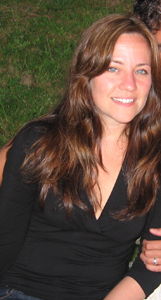Abigail Lewis Cooper ’98 is program officer at National Democratic Institute for International Affairs
 A trip to Honduras sponsored by the Alternative School Break Club as an undergraduate led Abigail Lewis Cooper ’98 to make one of the most important decisions of her life.
A trip to Honduras sponsored by the Alternative School Break Club as an undergraduate led Abigail Lewis Cooper ’98 to make one of the most important decisions of her life.
“[That] program in Honduras was my first experience with abject poverty,” says the French and international affairs graduate. “I actually made the decision to join the Peace Corps on that trip. It’s a great program for students to have a different spring break experience. We distributed clothing, taught English, and hooked up with Habitat for Humanity to build houses. There’s an innate feeling that this doesn’t seem fair that I have so much and other people don’t. And I was intrigued by other development organizations and curious as to how the whole process worked. Is it feasible to get aid to people and how does this work and how do aid organizations come up with solutions?”
As a Peace Corps volunteer, she spent two-and-a-half years in Ukraine as an English and French teacher. She also focused on running diversity and tolerance training camps. One, the Ukrainian American Community Outreach Retreat, was a two-week American-style camp for students from all over Ukraine. They explored issues related to democracy, tolerance, music, art, and sexual health. The students also met then-U.S. Ambassador to Ukraine Carlos Pasqual.
Cooper later joined the National Democratic Institute for International Affairs (NDI) as a program monitoring officer in the Democratic Republic of Congo. NDI is a nonprofit that provides practical assistance to civic and political leaders through a global network of volunteer experts to strengthen and expand democracy worldwide. In response to Congo’s first election in 40 years, she helped monitor progress, write and translate reports, and was manager of six democracy resource centers. She opened two in the politically tense cities of Goma and Nbuji-mayi.
“It happened to be a very unstable time in Congo’s history,” she explains. “Congo is huge – it’s about the size of Western Europe. [The democracy resource centers] focused on allowing a safe space for political parties to come together without the military.”
Now, after returning from her 17-month assignment in Congo, she is a program officer for NDI’s program development team. She searches for funding opportunities in the private sector and, once those funds are secured, helps the regional teams write proposals based on needs assessments in the field. She assists with the beginning stages of a program to help the teams plan what will happen on the ground.
“The most rewarding aspect of my job is helping design a clear program that I think is going to benefit lots of people in countries – from very grassroots programs to higher-level ones,” she says. “It’s like a puzzle, putting it all together.”
Cooper credits Lafayette with allowing her the flexibility to pursue her international interests and providing one-on-one resources to help her choose a career path. In addition to her travel with Alternative School Break, she spent a semester at the University of Haute-Bretagne in France.
“Studying abroad was a very formative experience, for sure,” says Cooper, who lived with a host family in Wrennes. “The program was fantastic – there were a lot of foreign students and our common language was French. French has been very useful for me. The job in Congo – I wouldn’t have had that opportunity without speaking French.
“My year abroad was probably the most formative of my experiences and Lafayette gave me the freedom to do that. There are some universities that didn’t allow you to enroll in another system and then return to their system. That was a really important aspect of my college career.”
She has stayed in touch with her host family, which attended her wedding in France in July 2008.
Cooper also believes that her undergraduate years provided valuable interactions with faculty and leadership opportunities. She especially remembers the help and advice of her adviser, George Rosa, associate professor and assistant head of foreign languages and literatures, and Robert Weiner, Jones Professor of History and Jewish chaplain.
“Lafayette was challenging and the main thing is that you got a lot of catered attention and you were able to do things you wouldn’t have been able to do at a university,” she says. “I was president of French Club and involved in the European Union simulation in Washington, D.C. When you’re at a really formative age, it’s good to have discussions with professors about what’s out there and what you can do. Overall, the ability to really have access to my professors and question them in and out of the classroom and have informal time with them was really important to me as far as choosing what to do.”
Cooper’s sister, Catherine Lewis ’04, is an English graduate.
 A trip to Honduras sponsored by the Alternative School Break Club as an undergraduate led Abigail Lewis Cooper ’98 to make one of the most important decisions of her life.
A trip to Honduras sponsored by the Alternative School Break Club as an undergraduate led Abigail Lewis Cooper ’98 to make one of the most important decisions of her life.